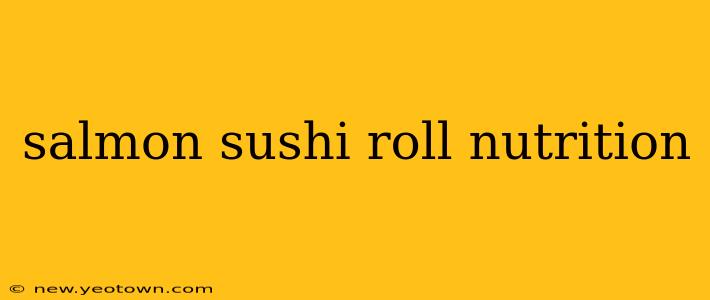Sushi, with its vibrant colors and delicate flavors, has become a global culinary sensation. But beyond the delightful taste, lies a world of nutritional nuances. Let's delve into the specifics of a salmon sushi roll, exploring its calorie count, macronutrient breakdown, and the vital vitamins and minerals it offers. Our journey will uncover why this seemingly simple dish can be a surprisingly healthy addition to a balanced diet.
Imagine this: you're seated at a cozy sushi bar, the aroma of rice vinegar and fresh seafood filling the air. You order your favorite – a salmon avocado roll. The anticipation builds as the chef meticulously crafts your meal, rolling the perfect combination of succulent salmon, creamy avocado, and subtly sweet sushi rice into a neat cylinder wrapped in seaweed. This isn't just a meal; it's a culinary experience. But what exactly are you consuming? Let's break it down.
How Many Calories Are in a Salmon Sushi Roll?
The calorie count of a salmon sushi roll varies significantly depending on several factors. The size of the roll, the amount of rice used, the inclusion of additional ingredients like mayonnaise-based sauces, and even the type of salmon used all contribute to the final calorie number. Generally speaking, a standard salmon avocado roll (6 pieces) can contain anywhere between 250-400 calories. It’s always a good idea to check the restaurant's menu or nutritional information if available for the most accurate count.
What are the Macronutrients in a Salmon Sushi Roll?
A typical salmon sushi roll provides a balance of macronutrients:
-
Protein: Salmon is an excellent source of high-quality protein, essential for building and repairing tissues, supporting immune function, and providing satiety. A single roll provides a decent amount of protein, contributing towards your daily needs.
-
Carbohydrates: The majority of carbohydrates in a sushi roll come from the sushi rice. While rice provides energy, it’s important to be mindful of portion sizes, especially for those managing blood sugar levels.
-
Fats: Salmon is rich in healthy fats, particularly omega-3 fatty acids, known for their anti-inflammatory properties and heart-health benefits. These fats are crucial for brain function and overall well-being. Avocado, if included, further boosts the healthy fat content.
Is Salmon Sushi Healthy? What are the Health Benefits?
Beyond the macronutrient profile, salmon sushi offers several compelling health benefits:
-
Omega-3 Fatty Acids: As previously mentioned, salmon is a powerhouse of omega-3s, specifically EPA and DHA. These essential fatty acids are linked to reduced risk of heart disease, improved brain function, and decreased inflammation.
-
Vitamin D: Salmon is a good source of vitamin D, vital for bone health, immune function, and mood regulation.
-
Protein Powerhouse: The protein in salmon aids in muscle building, repair, and satiety, helping you feel full and satisfied after your meal.
-
Other Nutrients: Salmon also provides a range of other vitamins and minerals, including vitamin B12, potassium, and selenium.
What are the Potential Downsides of Eating Salmon Sushi?
While salmon sushi offers numerous health benefits, it's important to be aware of potential drawbacks:
-
Mercury Content: Salmon, like other fish, can contain mercury. However, the levels in salmon are generally considered low, making it a relatively safe choice. Still, moderation is key.
-
Sodium Content: Sushi rice and soy sauce often contain significant amounts of sodium. Individuals watching their sodium intake should be mindful of their portion size.
-
Rice Calories: The rice in sushi rolls contributes a substantial portion of the calories. Overconsumption of rice can lead to weight gain.
-
Raw Fish Risk: While reputable sushi restaurants maintain high hygiene standards, there’s always a small risk associated with consuming raw fish. Ensure you choose a trustworthy establishment with a good reputation.
Is Salmon Sushi Good for Weight Loss?
Salmon sushi can be part of a weight-loss diet, but mindful consumption is essential. The calorie and fat content can vary significantly, so choosing smaller rolls, avoiding extra mayonnaise or sauces, and being aware of portion sizes will help you stay within your daily caloric goals. The high protein content aids satiety, helping you feel fuller for longer.
How Often Should You Eat Salmon Sushi?
There's no strict guideline on how often you should eat salmon sushi. Moderation is key. Enjoying salmon sushi as part of a balanced and varied diet a couple of times a week is generally considered safe and healthy for most individuals.
In conclusion, a salmon sushi roll can be a nutritious and delicious meal, offering a good balance of protein, healthy fats, and essential vitamins and minerals. However, like with any food, moderation and awareness of potential downsides are crucial for optimal health benefits. Enjoy responsibly!

